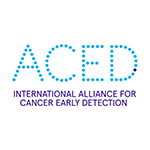
Submitted by Catherine Atkins on Mon, 14/11/2022 - 17:33
The ACED Early Career Pathway Awards act as a springboard for early-career researchers establishing independence by funding exceptional science in cancer early detection through collaborative research. The award aims to help early career researchers gain multidisciplinary skills, provide opportunities to obtain mentorship from researchers in the field, and to obtain preliminary data for future independent fellowship applications.
Adriana Fonseca, PhD student in the Blundell lab, has been awarded funding for her project Defining a new methylation clock from serial samples for improved cancer risk prediction. The project builds upon the work undertaken during her PhD.
Adriana explains: “Cancer risk increases very strongly with age. However, there is no way to precisely measure “biological age”. A promising measure is methylation: a chemical mark often added to cytosine, one of the four building blocks of DNA, when it is followed by a guanine (known as a CpG site). Studies have found that methylation levels at certain CpGs change consistently with age. This phenomenon is termed the “methylation clock”.
These clocks offer a new way to examine ageing and declining health. There is evidence that cancerous tissues look “older” than healthy tissues, raising the prospect that accurate methylation clocks may offer a way of predicting those most at risk of developing cancers. However, current clocks were built using samples from people of different ages, rather than the same person through time, have only looked at a small proportion of the possible CpGs, and are not fine-tuned for short timeframes (<10 years).
I propose to build an improved clock using an ideal set of samples: blood samples taken from 100 healthy individuals every year for a decade. To do this, I will leverage state-of-the-art assays I have developed to measure methylation in these samples. I will further develop algorithms generated during my PhD to identify regions which change through time and characterise this change. By fine-tuning the expected relationship between the methylation clock and chronological age one can identify individuals whose methylation clocks are significantly older than their chronological age and test whether these age-accelerated signals are linked to cancer.”
Adriana’s exciting project will be mentored by Dr Jamie Blundell in Cambridge, and Dr Hisham Mohammed at OHSU
Also at Cambridge Dr Hannah Harrison’s Early Career Pathway Award will fund her project entitled Clinical benefit of prognostic models for early cancer detection in primary care: the role of medical history, symptoms and genetics. Hannah is a Research Associate in the Department of Public Health and Primary Care and her project will be mentored by Prof Antonis Antoniou at Cambridge and Dr Georgios Lyratzopoulos at UCL
Hannah describes her project: “Decisions about whether to refer a person with symptoms for investigation can be very difficult for GPs. These symptoms could be caused by cancer but are most likely to have another explanation. However, prompt referrals are important for diagnosing cancer quickly and improving the likelihood of survival. Risk assessment tools (or risk models) can calculate a personalised risk for each patient, taking into account many characteristics of a patient, such as their age, medical history, recent test results as well as any symptoms. A new set of models, for ten common cancers, are being developed that will also include genetic risk.
In this proposal, I will test the new risk models to check if they correctly identify the patients at highest risk of cancer. I will also measure how the number of people referred for further investigation would change and how long it would take patients with cancer to be diagnosed. I will compare the new models to existing risk assessment tools and current referral guidelines used by GPs. I will also look at variation between different sections of the population (for example, men and women) to check that no one group would be disadvantaged by using these models.
The results will provide important information to be considered when deciding if this type of risk assessment tool should be recommended to GPs. It will also tell us which patients (based on the type of cancer and type of symptom) are most likely to benefit from this change.”
ACED Early Career Pathway Awards were also awarded to two researchers from UCL, Matthew Barclay and Marianthi-Vasiliki Papoutsaki. We offer our congratulations to all these early career researchers on this exciting opportunity to further their important work.
